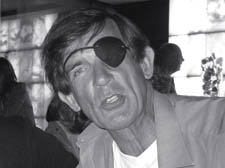
Christopher Barker looks back with ‘tenderness and courage’ on his parents’ story |
It was the best of times and the worst of times
Fiona Green applauds Christopher Barker’s tribute to his creative but wayward parents – poet George Barker and writer Elizabeth Smart
The Arms of the Infinite by Christopher Barker. Pomona Press £9.99 order this book
CHRISTOPHER Barker is the son of the writer Elizabeth Smart and the notorious poet, George Barker, and in this memoir about his parents, he describes their first meeting and subsequent elopement; revealing a passionate, obsessive and often volatile affair.
Christopher’s prose is perfect and his sentiments wonderfully understated. The book begins with a shocking first chapter describing his mother’s death, and ends on his father’s demise.
Drawing on some previously unpublished material – in the form of letters, excerpts from journals and diaries – Christopher’s carefully shaped retrospective looks back with tenderness and courage, as he unfolds the tragic story of two talented bohemians.
Christopher’s attention to detail is astonishing and worth savouring.
Elizabeth’s early life began in Canada as a debutante, with a mother determined to marry her to an aristocrat. She was educated at private schools in Canada and at King’s College London.
After a series of dalliances with dull, unsuitable aristocrats, she wrote in 1936: “I must marry a poet. It’s the only thing. Why don’t I know any?”
She was also growing more aware that she would make writing her life’s occupation. One day later that year, in Better Books on Charing Cross Road, she found a slender book of poetry by George Barker and fell in love with the writing. She sets out in earnest to meet and marry him.
In the intervening period, she had an affair with a passionate Turk called Varda, who introduced her to Surrealism – and to Alice Paalen. It was within the close, sexual relationship with this writer she learned to understand her controlling mother, and the knowledge released her to fulfil her obsession with Barker.
Elizabeth writes to George, inviting him to America. He responded immediately, believing her to be a wealthy woman with funds who would free him from a hated lectureship in Japan, and conscription in England.
Elizabeth raised the funds, little realising that in so doing she was laying down a template of behaviour which was to be repeated relentlessly throughout their relationship: George expecting money from her, and moving faithlessly between her and Jessica, the wife he was bringing with him.
The story of their love affair is famously recorded by Elizabeth in By Grand Central Station I Sat Down and Wept and by George in The Dead Seagull.
I met Elizabeth in 1961 and she took me under her wing like an older sister or surrogate mother. We met in the Fitzroy Tavern, Charlotte Street and I stayed variously at her house in Suffolk and at her flat in Soho. I also got to know Sebastien and Rose, two of her four children.
Christopher’s chapter on Rose is an almost unbearably painful description of his vulnerable sister’s decline into heroin dependency – a casualty of George’s lack of commitment to his children.
When I first met George he proudly told me “I have 13 children and 14 published books: I think that’s a record”.
I was unimpressed by this attitude to children as trophies. As was Rose, who at 13 wrote in her diary in 1960 “I wish my father would be like a father. He never pays for anything, he doesn’t seem to realise he has a wife and four children who need money to live.
“I don’t see how he can expect us to love him, although I still do, but I can’t say I always speak highly of him... oh I wish he didn’t drink.”.
Rose was beautiful, passionate and died of a heroin overdose at 36. Her life was really one suicide note and an endless cry for help, which George, the narcissist, rarely responded to. Elizabeth never really recovered from her tragic death.
This book by Christopher is enormously loving and forgiving: a really honest tribute to his creative and wayward parents; an important record of their turbulent times and now one of my favourite books.
|



